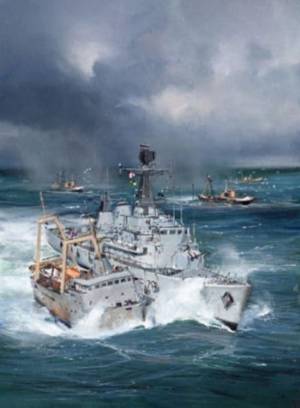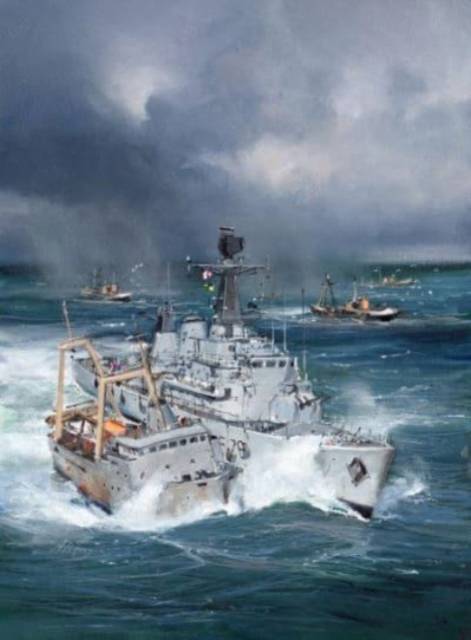
En raison d'une grêve chez bpost, votre commande pourrait être retardée. Vous avez besoin d’un livre rapidement ? Nos magasins vous accueillent à bras ouverts !
- Retrait gratuit dans votre magasin Club
- 7.000.000 titres dans notre catalogue
- Payer en toute sécurité
- Toujours un magasin près de chez vous
En raison de la grêve chez bpost, votre commande pourrait être retardée. Vous avez besoin d’un livre rapidement ? Nos magasins vous accueillent à bras ouverts !
- Retrait gratuit dans votre magasin Club
- 7.000.0000 titres dans notre catalogue
- Payer en toute sécurité
- Toujours un magasin près de chez vous
The Royal Navy and Fishery Protection
From the Fourteenth Century to the Present
Jon Wise
Livre relié | Anglais
34,95 €
+ 69 points
Description
From the first recorded mention of British ships protecting of fishing vessels in the late fourteenth century through to recent controversies over the change in emphasis to border patrols and overseas deployments, the story of the Royal Navy's 'Cinderella Fleet' involves many dramatic incidents; until now, however, there has never been a book dedicated to the subject. Naval historian Jon Wise's new work will rectify this omission.
Historically there have been two main reasons why protecting fishing vessels was so important: first, fish have always constituted an essential part of the nation's diet while, secondly, fishermen have been an important source of skilled personnel for the Royal Navy itself. It is claimed that the Fishery Protection Squadron (FPS) is the oldest in the fleet, pre-dating the formal creation of the Navy itself in the early part of the sixteenth century, yet it still remains comparatively little-known. The Squadron's most famous operations were the 'Cod Wars' of 1958-76, but for six centuries it has been engaged in the many important tasks of protection and policing of fishing fleets, though more recently it has turned its attention to patrolling oil and gas fields, overseeing quotas and sustainability, and policing the ongoing disagreements over who can fish where and when.
The author covers subjects as diverse as the battles with the Dutch for dominance in the North Sea, the protection of fishing on the eastern seaboard of America, and the role of the Squadron in the two World Wars. Containing many first-hand accounts, this thought-provoking narrative will be of particular interest to all those RN personnel who have served in the Squadron, and is set to become the definitive account of this vital but often unsung component of Britain's naval forces, and its impact on national life.
Historically there have been two main reasons why protecting fishing vessels was so important: first, fish have always constituted an essential part of the nation's diet while, secondly, fishermen have been an important source of skilled personnel for the Royal Navy itself. It is claimed that the Fishery Protection Squadron (FPS) is the oldest in the fleet, pre-dating the formal creation of the Navy itself in the early part of the sixteenth century, yet it still remains comparatively little-known. The Squadron's most famous operations were the 'Cod Wars' of 1958-76, but for six centuries it has been engaged in the many important tasks of protection and policing of fishing fleets, though more recently it has turned its attention to patrolling oil and gas fields, overseeing quotas and sustainability, and policing the ongoing disagreements over who can fish where and when.
The author covers subjects as diverse as the battles with the Dutch for dominance in the North Sea, the protection of fishing on the eastern seaboard of America, and the role of the Squadron in the two World Wars. Containing many first-hand accounts, this thought-provoking narrative will be of particular interest to all those RN personnel who have served in the Squadron, and is set to become the definitive account of this vital but often unsung component of Britain's naval forces, and its impact on national life.
Spécifications
Parties prenantes
- Auteur(s) :
- Editeur:
Contenu
- Nombre de pages :
- 320
- Langue:
- Anglais
Caractéristiques
- EAN:
- 9781399041706
- Date de parution :
- 12-10-23
- Format:
- Livre relié
- Format numérique:
- Genaaid
- Dimensions :
- 160 mm x 246 mm
- Poids :
- 748 g

Les avis
Nous publions uniquement les avis qui respectent les conditions requises. Consultez nos conditions pour les avis.






